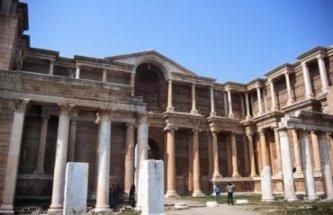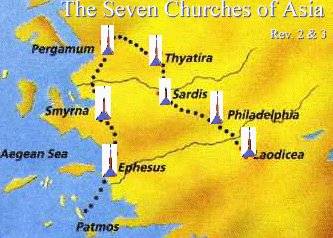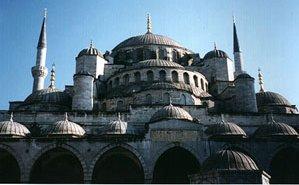SITES OF FAITH IN TURKEY
The Anatolian peninsula, spanning two continents,
forms a natural land bridge between Europe and Asia. Due to its unique
position, Anatolia has been the destination for numerous immigrants, many
of them leaving the indelible mark of their cultural heritage during their
settlement in this area, now known as Türkiye (Turkey).
Anatolia has been the cradle of
numerous civilizations for thousands of years and the birthplace of the
three major religions: Christianity, Judaism and Islam. This fact alone,
lends Turkey its unique and invaluable cultural
and archaeological heritage. Because
of its secular position in the world, the Turkish attitude toward religion
has been on of tolerance.
 Judaism,
which was the first monotheistic religion, was widespread in Anatolia.
Recent archaeological excavations conducted in the Aegean region indicate
Judaism's existence since the early 4th century B.C. Sardis (Sart) contains
the remains of one of the oldest synagogues dating back to 220 B.C. which
provides a fine structural and archaeological example of this place of
worship.
Judaism,
which was the first monotheistic religion, was widespread in Anatolia.
Recent archaeological excavations conducted in the Aegean region indicate
Judaism's existence since the early 4th century B.C. Sardis (Sart) contains
the remains of one of the oldest synagogues dating back to 220 B.C. which
provides a fine structural and archaeological example of this place of
worship.
Remains of another ancient settlement belonging to the Jewish people
was unearthed during excavations conducted along the Aegean and Black Sea
Coasts.
The Ottoman Empire had always been tolerant of non-Moslems and never
forbid or restricted their worship in accordance with their religion.
In 1324, when Orhan Gazi conquered Bursa, he permitted the Jewish people
to construct Etz-Hayim Synagogue. In 1934, the Jewish people departed from
France on the orders of Charles VI and look refuge in Edirne.
Then in 1492, Spain's King Ferdinand of Aragon and Queen Isabella of
Castilla expelled the Jews (Inquisition). The Ottoman Empire of that time,
ruled by the sultan Beyazid II, had embraced those Jews who were left homeless
as a result of their deportation from Spain due to their conventions and
beliefs and settled them in Anatolia.
Sephardic Jews had lived for centuries among the Turks in peace and
comfort and followed their beliefs under the auspices of Turkish tolerance
(secularism).
 Anatolia
is also as significant area for Christians and is considered holy and sacred
for many reasons which include:
Anatolia
is also as significant area for Christians and is considered holy and sacred
for many reasons which include:
-St. Paul, one of the 12 apostles of Jesus Christ, devoted himself
to the dissemination and expansion of Christianity, was born in Tarsus.
-The Seven Churches of the Apocalypse which were mentioned in Revelations
and are located in Anatolia; Ephesus (Efes), Smyrna
(Izmir), Pergamum (Bergama), Thyatria (Akhisar),
Sardis (Sart), Philadelphia (Alasehir), Laodicea (Denizli).
-Saint John lived and died in Ephesus. His grave and the church is
in Selcuk, Izmir, nearby Ephesus.
-The first eight of the Council meetings which have been held 19 times
until now, were held in Turkey. Especially, holding of the first and seventh
meetings in Iznik established the tradition of holding these meetings regularly.
-The believers of Christ were called "Christian" for the first time
in Antakya. The first church of Christianity was carved in a cave in Antioch
and called St. Peter's Grotto.
-Virgin Mary spent the last days of her life in Ephesus. The first
church dedicated to her is also in Ephesus.
-Saint Nicholas was born in Patara and became bishop in Myra.
-The Apostle St. Philip lived in Hierapolis and was martyred there.
The Turks who settled in Anatolia after 1071 constructed many important
religious symbols related the to Islamic faith. These examples which reflect
the architectural style of the Islamic periods may be classified as follows:
* Mosques (Cami)
* Theological Schools of the time (Medrese)
* Building Complexes adjacent to a Mosque (Külliye)
* Shrines (Türbe)
* Tombs with conical roofs (Kümbet)
 Turks
preserved and protected the synagogues and churches which belonged to the
Jewish and Christian faith that exist even in areas where Jewish or Christian
populations were practically non-existent.
Turks
preserved and protected the synagogues and churches which belonged to the
Jewish and Christian faith that exist even in areas where Jewish or Christian
populations were practically non-existent.
It must be emphasized here that these well preserved holy places show
the best and most concrete example of how the Islamic religion treats other
religions in tolerance and respect. Today, you can find hundreds of religious
examples in each and every town and city of Turkey, especially in Istanbul.
The Turkish people, the majority of them Moslem, who continue to carry
on their traditions and conventions in a contemporary manner and in harmony
with their Islamic beliefs, have constructed mosques, tombs and similar
religious areas which reflect both the features of Anatolia where the Turks
have been living for centuries and their artistic values as well as their
religious importance.
An important sector of polytheistic religions had flourished in Anatolia
as the monotheistic religions were established in the Middle East and as
the religious areas were discovered. These places have been considered
holy and sacred since the Middle Ages and were located in Anatolia a region
that has and still does act as a cultural bridge due to Turkey's geopolitical
situation.
Since Turkey has traditionally been a secular corridor throughout history,
its role in international arenas has expanded and is currently one of most
strategic regions in the world, if not in the Middle East at his point
in time.
During their entire history, the Islamic Turks, as a result of humanitarian
attitude toward the beliefs of the followers of other monotheistic religions
that they were exposed to, in a vast tolerance in obedience with the rules
and beliefs of the Islamic religion, had lived together with numerous ethnic
groups in Anatolian areas in peace and content.
The non-Moslem population had the right of living and setting wherever
they wanted during both the Ottoman period and the republican era. Without
any discrimination Islamic or non-Islamic Turkish citizens have had the
right of jurisdiction, religious belief and concept and conducted their
religious services, prayers and ceremonies freely in their holy places
such as mosques, churches and synagogues.
As a result of this tolerant recognition all the divine places belonging
to Judaism and Christianity have been carefully preserved and protected.
Go back to the Homepage
 Judaism,
which was the first monotheistic religion, was widespread in Anatolia.
Recent archaeological excavations conducted in the Aegean region indicate
Judaism's existence since the early 4th century B.C. Sardis (Sart) contains
the remains of one of the oldest synagogues dating back to 220 B.C. which
provides a fine structural and archaeological example of this place of
worship.
Judaism,
which was the first monotheistic religion, was widespread in Anatolia.
Recent archaeological excavations conducted in the Aegean region indicate
Judaism's existence since the early 4th century B.C. Sardis (Sart) contains
the remains of one of the oldest synagogues dating back to 220 B.C. which
provides a fine structural and archaeological example of this place of
worship.
 Anatolia
is also as significant area for Christians and is considered holy and sacred
for many reasons which include:
Anatolia
is also as significant area for Christians and is considered holy and sacred
for many reasons which include:
 Turks
preserved and protected the synagogues and churches which belonged to the
Jewish and Christian faith that exist even in areas where Jewish or Christian
populations were practically non-existent.
Turks
preserved and protected the synagogues and churches which belonged to the
Jewish and Christian faith that exist even in areas where Jewish or Christian
populations were practically non-existent.